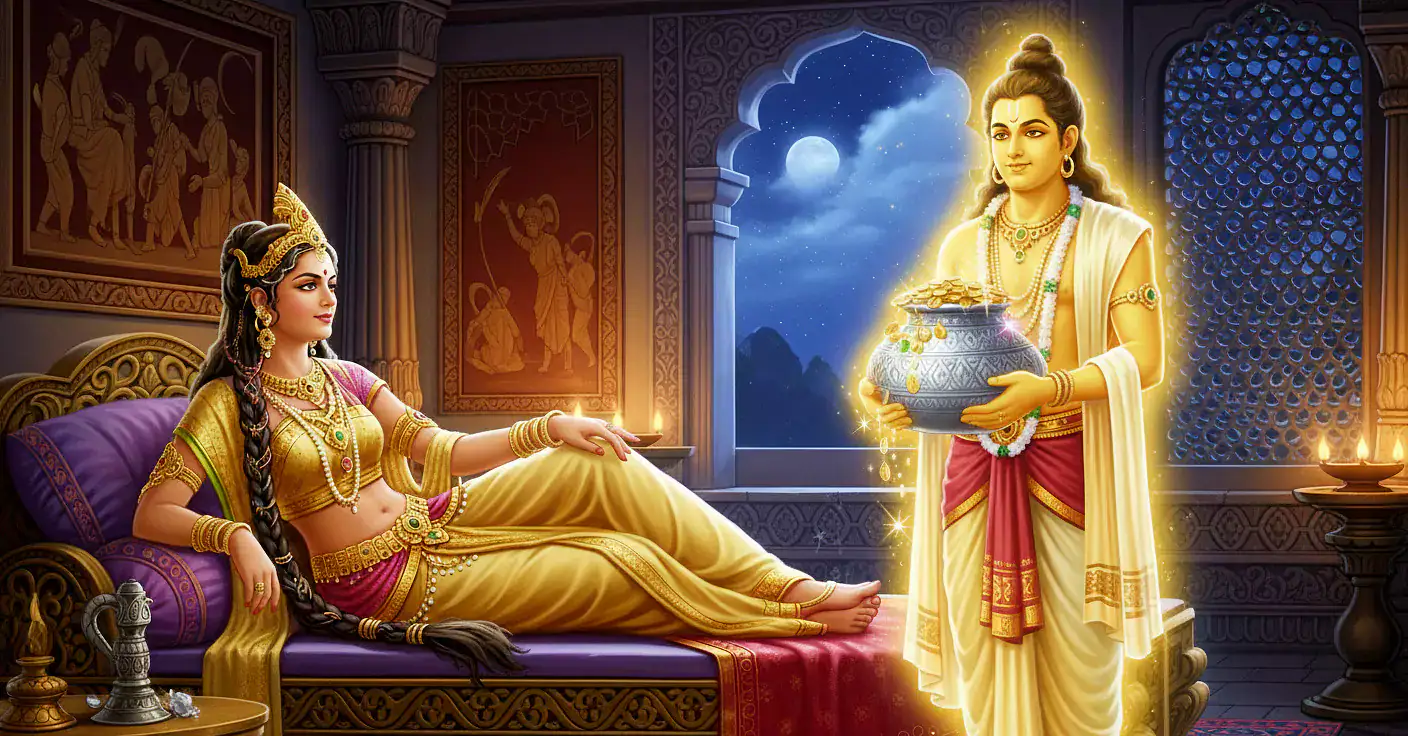UDAYA-JĀTAKA
-
Save
This story the Master told, while dwelling in Jetavana, concerns a backsliding Brother. The occasion will be explained under the Kusa Birth.
Again the Master asked the man, “Is it true, Brother, that you have backslidden, as they say?” And he replied, “Yes, Sir.”
Then the Master said, “O Brother, why are you backsliding from a religion such as ours, which leads to salvation, and all for fleshly lusts? Wise men of old, who were kings in Surundha, a city prosperous and measuring twelve leagues either way, though they abode for seven hundred years in one chamber with a woman beauteous as the nymphs divine, yet did not yield to their senses, and never so much as looked at her with desire.”
So saying, he told a story of the past.
Once upon a time, King Kāsi ruled over the land of Kāsi, in the city of Surundha. He had no children, so he asked his queens to pray for a son. Then the Bodhisatta, leaving Brahma’s world, was conceived in the womb of the king’s chief queen.
Because his birth brought joy to many, he was named Udayabhadda, meaning “Welcome.” When he could walk, another being from Brahma’s world was born as a girl in the womb of another queen. She was named Udayabhaddā, the same as the prince.
As he grew up, the prince learned everything in education and was extremely pure. He had no desire for sinful acts and did not even dream of them. The king wished to make him king and arranged celebrations, but the Bodhisatta refused:
“I do not want the kingdom, and my heart is free from sin.”
The king pleaded many times, but the Bodhisatta sent them a golden image of a woman, saying:
“When I find a woman like this, I will accept the kingdom.”
The golden image was sent throughout India, but no woman matched its beauty. Then the princess Udayabhaddā, the Bodhisatta’s sister by another mother, was shown the image. Her beauty surpassed it, and so she was wedded to him, and he was sprinkled to be king.
Even as husband and wife, they lived a chaste life. They shared a chamber but denied all desires and promised each other:
“Whichever of us dies first will return in the next life and tell the other where we are born.”
The Bodhisatta ruled for 700 years. When he died, Udayabhaddā ruled according to his commands. The Bodhisatta was reborn as Sakka in the Heaven of the Thirty-Three. At first, he forgot his past life for seven days, but then he remembered:
“I must go to the king’s daughter Udayabhaddā. I will test her with riches, speak with the roar of a lion, and keep my promise.”
At that time, people lived ten thousand years. One night, the palace doors were closed, and the princess sat alone on the terrace of her seven-storey mansion, meditating on her virtue. Then Sakka appeared, carrying a golden dish of coins. Standing to one side, he spoke to her:
“Flawless in beauty, pure and bright,
Sitting alone on this terrace,
In a pose most graceful, like a heavenly nymph,
I pray, let me spend this night with thee!”

-
Save
The princess replied to Sakka in two stanzas:
“This walled city, dug with moats, is hard to enter,
Its trenches and towers are guarded with sword and hand.
Neither the young nor the strong can enter easily;
Tell me—why do you wish so much to meet me?”
Sakka answered in the next stanza:
“I, fair lady, am a Goblin appearing to thee.
Grant me your favor, and take this full bowl from me.”
The princess replied firmly:
“I ask for none, since Udaya is dead.
Neither god, goblin, nor man shall I accept.
Therefore, mighty Goblin, go away,
Come no more here, but stay far off.”
Hearing her strong words, Sakka pretended to leave and vanished.
The next day, at the same hour, he returned with a silver bowl filled with gold coins and said:
“The greatest joy known to lovers, which makes men do many wrongs,
Do not despise it, lady, smiling sweetly.
See, a full bowl of silver I bring to you!”
The princess thought, “If I answer him, he will keep coming back. I will say nothing.” So she remained silent. Seeing this, Sakka disappeared immediately.
The following day, he came again, this time with an iron bowl full of coins, saying:
“Lady, if you bless me with your love, I will give this bowl to you.”
The princess replied:
“Men who woo a woman raise their offers of gold until she obeys.
The gods’ ways are different, as I judge by you.
Today you come with less than before.”

-
Save
When the princess spoke, the Great Being (Sakka) replied:
“Lady Princess, I am a careful trader and waste nothing.
If your youth and beauty were growing, I would offer more;
But as you fade, so does my gift.”
He then recited three stanzas:
“O woman, youth and beauty fade in this world of men.
Today you are older than before, so my offering lessens.
Yet, fair daughter of a king, if you remain holy and pure,
You shall grow even more beautiful!”
The princess asked:
“The gods do not age, nor show wrinkles.
How is it that gods have no physical decay?”
Sakka explained:
“The gods do not grow old; their flesh never wrinkles.
Day by day, their celestial beauty and bliss increase forever.”
Curious about reaching that world, she asked:
“What terrifies mortals here?
Show me the path heavenwards, so none need fear.”
Sakka replied:
“Those who control their mind and speech,
Who do not act in sin,
Who are generous, truthful, and kind,
May ascend to heaven without fear.”
The princess thanked him:
“Like a mother and father, you instruct me, mighty one.
Tell me, who are you?”
The Bodhisatta replied:
“I am Udaya, fair lady, come to fulfill my promise.
Now I go, for my task is done.”
The princess, realizing who he was, cried:
“You are King Udayabhadda, my lord!
Without you, I cannot live. Teach me, that I may live with you always!”
She added:
“If you are Udaya, come to me for your promise—
Teach me, that together we may be again.”
The Bodhisatta instructed her in four stanzas:
“Youth passes quickly; all creatures die.
Be careful and walk in piety.
Even if one could hold all the wealth of the world,
A holy saint would leave it. Walk in piety.
Mother, father, kin, and even a wife bought with gold,
They leave one another; walk in piety.
This body will pass; joy and misery alike are fleeting.
Walk in piety.”
Pleased with his teaching, the princess said:
“Sweet are these words: life is short and full of sorrow.
I renounce the world. From Kāsi and Surundhana, I go.”
The Bodhisatta then returned to his place.
The next day, the princess entrusted her kingdom to her courtiers. In a lovely park, she became a recluse, living righteously until the end of her days. Later, she was reborn in the Heaven of the Thirty-Three as the Bodhisatta’s handmaiden.
When the Master finished telling the story, he explained the Truths and revealed the past-life identities:
“At that time, Rāhula’s mother was the princess, and Sakka was myself.”
By hearing this, even a monk who had strayed from the path was able to be established in the first stage of enlightenment.
